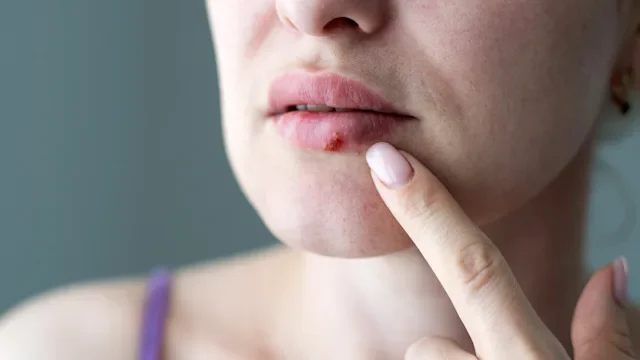Key takeaways:
Adrial Dale was diagnosed with genital herpes in his 20s.
He has since learned how to talk about the condition and the stigma surrounding it.
Now, he helps others do the same.
In 2005, Adrial Dale was a 20-something professional living in North Carolina when he learned he’d contracted genital herpes — a diagnosis that hit like a hammer.
He didn’t know how it might impact him medically, but he felt awash in stigma and shame. And he feared his future was forever changed.
“My life is over. I’m never going to find someone to love or who is going to love me,” he recalls thinking, imagining a life of celibacy.
Search and compare options
But it’s a condition that is more common than many realize, he says.
The Centers for Disease Control and Prevention (CDC) says genital herpes affects more than 1 out of 6 people ages 14 to 18.
Since diagnosis, Adrial, now 42, has learned to navigate the condition, gotten married, and had a child. Now, he helps others shed the stigma that he says can often have a bigger impact than the virus itself.
“Life goes on,” he says. “If I would have told my old self that, he wouldn't have believed me.”
Herpes diagnosis brings struggles
Growing up, Adrial heard the jokes. He’d made them himself. To him, herpes was associated with sexual promiscuity and disease.
- ValtrexValacyclovir
- ZoviraxAcyclovir
- FamciclovirGeneric Famvir
“It was just a scarlet letter,” he says, reflecting a history that included a 1980s Time Magazine cover with those very words. After the diagnosis, he says, “It felt like I got kicked in the gut.”
He first searched online and found worst-case photos and “one positive story for every 20 negative ones,” he says, eventually finding his way to information from Planned Parenthood.
While herpes virus can’t be cured, antiviral treatments reduce symptoms and its ability to spread. Condom use reduces the risk of spread but not completely.
How herpes virus impacts any particular person can vary, forcing Adrial to endure an excruciating “waiting game” after his diagnosis.
“How often am I going to have an outbreak? How bad is it going to be the second time and third time? Am I going to have these weekly or monthly or yearly?” he recalls.
Adrial, who takes twice-daily antivirals, found the medical impact of sores appearing were less frequent than he expected.
In Adrial’s situation, “in the first year or so, it was about monthly,” he says. “And then it started to taper off from there. The physical manifestation of it was never even close to what I was really terrified of.”
What loomed larger, he says, was how he would tell people outside a close circle — and whether he’d ever date again.
“If I say the word ‘herpes’ to a partner, there's not going to be a relationship. So, I might as well not even try,” he says of his thinking at the time. “It was this classic self-rejection thing. Why bother?”
Learning to manage the stigma
Adrial told his mother first, then close family and friends. Other than that, he dealt with it silently — and suffered from loneliness.
“It was a rough road for a few years there — until I finally got up the courage to go to an in-person support group. And that was terrifying,” he says.
A key turning point came when he formed a men’s group and, one night, shared his diagnosis and struggles. Even though the other men didn’t have herpes, they each had their own personal experience of shame, and that connected them all, he said.
“As I was talking, I was still looking at the ground the whole time, looking at my floor. When I had the courage to actually look up and look in their eyes, we were all crying,” he says.
The groups helped him realize that some herpes sufferers were “believing the hype about stigma and shame.”
Nonetheless, the stigma was still evident. At one dinner party, he recalled, a friend’s fiance made a herpes joke. Adrial decided to be upfront about it and say that he had it.
“Before getting herpes, I would make these snide jokes here and there, not even realizing that it might be hurting someone's feelings,” he says. But in that moment, he got to see in his friend’s eyes a realization of how common it is.
Eventually, he began dating. That meant disclosing herpes before a sexual relationship developed. How soon he chose to have the conversation depended, he says.
“The answer is when you can feel like you trust them with your vulnerability. For me, it might be on, like, the first date where I'm like, ‘Oh, yeah, we have this chemistry,’” he says.
A couple of times, he says, women he was dating declined to continue the relationship once he told them.
Then, about 7 years ago, he met Heather, now 43, the woman he would later marry.
“We had been dating for months. And we obviously weren't intimate, but we were really getting to know each other,” he says.
They walked to a creek near his house and sat down.
“Hey, I have something important that I want to talk to you about,” he says. “Are you up for talking about something real?”
Life after herpes and helping others
Heather already knew of his diagnosis by searching his name and reading his blog, and the disclosure brought them closer, he says. His honesty deepened her trust for him.
“That was 7 years ago. We got married 5 years ago,” he says, noting his wife has remained herpes-negative through safe practices including antiviral medication.
His experience sharing with the men’s group led him to create a herpes-positive blog. He soon realized how many people were facing similar struggles.
In 2011, he founded the organization Herpes Opportunity, which helps people cope with herpes with forums, e-books, courses, coaching, and other guides and programs.
“The first piece of advice would be to find people you trust, who you can share yourself with,” he says. “Shame is like an acid that eats away at you if you just hold it inside yourself.”
In recent years, he’s seen attitudes change with more awareness and acceptance. But unless people or loved ones are affected, misconceptions can still prevail.
“It’s a mixed bag,” he says, with the stigma in some cases “as strong as ever, unfortunately.”
He encourages people to look beyond it while realizing that vulnerability in sharing struggles can deepen relationships and other aspects of life.
“This is the mountain that you get to climb to become a better version of yourself,” he says.

Why trust our experts?

















